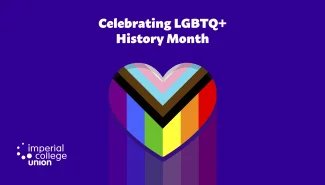Queer: denoting or relating to a sexual or gender identity that does not correspond to established ideas of sexuality and gender, especially heterosexual norms.
But what does being queer mean to us? When we were younger, being queer meant being different. Being ostracised, being bullied, being less. It meant hiding, dampening a core part of ourselves, for fear of serious consequences.
After years of becoming accustomed to keeping so much of ourselves hidden away, coming to university was a culture shock to say the least. We were suddenly thrown into an environment where people were applauded for being…themselves? Openly? Of course, not everyone we encountered shared that same sentiment, as I fear will always be the case, but we thankfully managed to surround ourselves with people who did. After years in the closet, university was the first place we felt safe and empowered to come out. That being said, coming out is a vastly different experience and process for everyone, and no one should feel pressured to do so before they’re ready to.
Joining IQ, Imperial’s LGBT+ society was perhaps the best decision we made, and would be our top tip to any new queer students coming to Imperial who want to find some community. We have so many different events - from loud nights out to wholesome evenings in, speed friending where you get to know loads of people very quickly to more lowkey quiet activities like art or movie nights, where you’re welcome to keep to yourself. There’s always something for everybody.
Though it's very easy for us to become comfortable living in our wonderful supportive bubble of friends, it is really important not to get complacent. In England and Wales, hate crimes against LGBT+ people have risen every year from 2016 to 2021. For hate crimes against transgender people, this figure has more than doubled. These statistics and stories in the news can seem shocking - often leading us to wonder how even in the modern day people can still hold such dangerous views. Whilst these violent attacks can seem shocking to most of us, they are the extreme manifestations of much more common homophobic and transphobic sentiments. This is why we believe being a good ally is essential, and it can include:
- Speaking out against hate speech or discrimination when we see it, even if it seems minor, even if it's from our friends.
- Supporting victims, and with their permission reporting incidents to your institution or the police
- Respecting people’s identities and using their preferred pronouns.
- Educating yourself about the experiences and issues facing the LGBT+ community.
- Supporting laws and policies that protect and uplift LGBT+ people.
Everyone, regardless of whether they are a member of the LGBT+ community or not, can help play a part in keeping LGBT+ people safe. This LGBT+ History month, we have a host of educational events and initiatives. For details visit this page.
Written by: Devni (Union LGBT+ Officer) and Max (IQ (LGBT+ Society) President)
